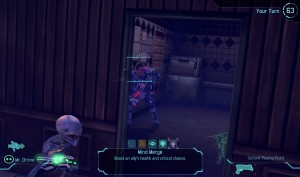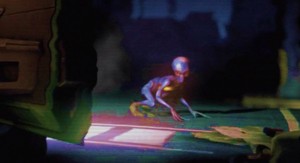XCOM’s Jake Solomon on Consequences
- Updated: 16th Aug, 2012
 XCOM: Enemy Unknown is looking very well for its 12th October release date. The big experience they’re showing off at gamescom is the last-man-standing multiplayer mode, which I’ll cover in another post later this week. I covered the single-player mode in a hands-on preview back in May. I talked with Lead Designer Jake Solomon about looting, international politics and the difficult choices you’ll face in the single-player campaign.
XCOM: Enemy Unknown is looking very well for its 12th October release date. The big experience they’re showing off at gamescom is the last-man-standing multiplayer mode, which I’ll cover in another post later this week. I covered the single-player mode in a hands-on preview back in May. I talked with Lead Designer Jake Solomon about looting, international politics and the difficult choices you’ll face in the single-player campaign.
I really liked that the single-player demo didn’t handhold us after the tutorial. Can you tell me about the pacing, how you approached that?
It’s interesting because the original game, 1994, the tutorial in that game was nothing. They dropped you in the game. They just said go on then, save the world. We knew that that was something we wanted to improve upon. It’s tricky with a game like this. There’s so many layers – the strategy layer, the combat layer – so the way we’ve tried to do it is what we call “blossoming”. It starts with a very small kernel of knowledge – the basic tutorial – but this pacing basically extends over the course of the first act of the game.
What we try and do is make sure that the players don’t feel like they’re being cheated when we set them free but we still don’t introduce a lot of concepts until maybe all the way through 5 hours of gameplay.
There’s research, engineerng but there’s also also expanding satellite coverage around the world. There is interacting with different countries diplomatically, and all these things, shooting down UFOs or preparing your jets for interception. There are all these layers to the gameplay.
You’re still introducing content 5 hours in. What do you think would be a typical single game?
If you win, you’re looking at anywhere from 20 to 30 hours. 20 hours is probably a little optimistic. Maybe 20 to 30 hours. You could certainly go over 30 hours. And of course we made the game infinitely replayable, where you start, what base locations you choose will change all the maps. We’ve built more maps than you’ll ever see in two playthroughs. You have to play through twice to get all the maps. It’s very playable whether you go for science or you go for engineering
Can you tell me more about the types of environment?
You fight in major cities around the world. There are urban environments, but then of course you have to eventually become proactive and shoot down the UFOs. When you do that, then you’ve got these UFOs shot down in the wilderness somewhere and your soliders are then fighting in the woods or on mountains. And then there are the ships themselves which are a whole other environment. You fight through the alien ships and then there are other environments as well.
One thing that I really liked was that you have the female doctor in the base and in the tutorial one of your squad was female. Can you tell me more about how you approach things like gender and race?
That’s something very important to me. I’m a father, I have a 2 and a half year old girl and I didn’t want this game to be… it’s soldiers and it’s got this hoo-rah macho feel to it but it’s an international force so I wanted it to be repesented with all the different nations of the world. You have soldiers from every continent and twenty different countries that have a very wide spectrum of all the different people in the world. I wanted the force to feel international, I didn’t want it to feel like Johnny USA, you know? “We’re off to save the world again” again, it’s important because the player can choose what contientnt they start from.
And then yes, the lead scientist is female, the chief engineer is an older Asian male. They were just sorts of things where we don’t want this to feel like a very bland stereotypical thing. I wanted it to be more reflective of the world and even with soldiers, we have combat soldiers who are just as likely to come up as female and maybe even more… I suppose that’s less representative of the combat force and again that was something that for us was very important. We want people to be able to have avatars, for people to customise them.
An avatar for you?
Well no, but all your individual soldiers that you can customise.
The bases – put it over here you get a boost for air space, put it over there, you get a boost for interrogation. Does that play in the politics of the countries?
Oh, it does. You can’t… it’s unlikely you’ll be able to hold onto all the countries. I think it’s something that sets XCOM apart in the sense that your soldiers can actually die in combat. When they do, they’re just dead. They’re gone. They don’t come back. So those types of real consequences again are sort of a core.
 So on the strategy layer, if a country feels like you aren’t responding to their needs… The player has to make tough choices. They have to focus the resource on certain areas of the globe and when they do that they’re not getting help in another area and that can make those countries unhappy. So when those countries feel like okay, you focused resource there, there’s always the change they’re gonna say “Okay, we’re out of the project.” When they do that, again that’s a permanent thing.
So on the strategy layer, if a country feels like you aren’t responding to their needs… The player has to make tough choices. They have to focus the resource on certain areas of the globe and when they do that they’re not getting help in another area and that can make those countries unhappy. So when those countries feel like okay, you focused resource there, there’s always the change they’re gonna say “Okay, we’re out of the project.” When they do that, again that’s a permanent thing.
Where you choose your base, you’re always gonna have a pretty strong base of support there but that makes it harder to expand to the other countries, because to launch satellites there you have to expand your jet coverage over there. It’s the sort of thing where based on where you start, you’re probably gonna keep those countries.
When you pick a mission from France, for example and the reward is you get a bunch of scientists, does that mean you get a bunch of French scientists?
The resources are more generic. I mean the scientist – your labs fill up with more scientists but they don’t actually have any particular affinity.Aalthough it’s funny that you say that because I’d often thought it’d be cool that if the country leaves then you lose all the soldiers from that country and any scientists and engineers you got from that country but it just became a hard thing to track. The player didn’t really follow it that well so I took it out. That was in there at one point.
So what happens when you lose a country then?
If they’re paying you money, you certainly lose any funding that they’re giving you and actually you will lose the game; the council can fall apart if too many countries leave. So that’s the problem – as countries leave the council begins to get shakier and shakier so a certain number of countries leave the council and you can actually lose the game. But also you lose any continent bonuses from that continent, any resources they’re giving you per month. You lose all that.
Can you tell me about the looting? Is there looting?
Yeah, there is except it’s not the kind of thing where soldiers actually pick it up but after the battle ends then you have this tally. It tries to be pretty one-to-one so if you kill a bunch of sectoids, you get all their bodies, you get any sort of alien hardware they were carrying and that stuff all come back to base with you. That’s what triggers all the research back at base.
 Yeah, there’s looting in the sense that every alien you kill, you get his body and everything he’s carrying – and alien bodies are actually a really important part of it. You can perform autopsies. you can even capture them alive if you want to. Risky, but you can capture them alive and you can even interrogate them. So there’s a lot of different ways to perform research on the aliens and all their artifacts.
Yeah, there’s looting in the sense that every alien you kill, you get his body and everything he’s carrying – and alien bodies are actually a really important part of it. You can perform autopsies. you can even capture them alive if you want to. Risky, but you can capture them alive and you can even interrogate them. So there’s a lot of different ways to perform research on the aliens and all their artifacts.
So the research tree – is it like a tree where you unlock things in order or is it mostly depend on what you find.
It’s a mix. There are sort of like core branches, I guess – I’m taking the tree metaphor maybe too far – but there are core things that you recover will then open up a new research branch and then those things will unlock more as you research them. And they’ll require resources as well so maybe you bring back some weapon fragments. That unlocks some new tech and then it unlocks more that require more and more weapon fragments to unlock. But then are other branches as well – so do you interrogate this sectoid, do you perform an autopsy, do you look at the weapon fragments. Do you look at all this UFO hardware that you brought back? They players always make those choices.
I had a soldier come back to me wounded. Does he sit around in an infirmary?
He does. In fact, you can go to the infirmary in your base and see him. But yeah when he comes back, again it’s the consequences thing. If a soldier is wounded, they’re actually out. They’re gonna have to take weeks to rest up. You’ll have to find somebody to take their place until they heal back up.
 And how does the levelling for those guys work?
And how does the levelling for those guys work?
What happens is they gain experience when they go on missions or make kills. It’s a pretty straightforward levelling system because the player has so many soldiers. We couldn’t make complicated levelling. Every promotion, the player will then choose one of two things for that soldier – between one or two abilities or perks and they’re generally opposed to each other. Is this guy more defensive, is he more offsenive, can he shoot from really far away or does he like to get up close to do damage?
Does he only get experience for kills?
No, he gets experience for going on missions and just surviving, which is an achievement in XCOM. Getting kills for sure but also if nobody – if the entire squad comes back without being killed then there’s a whole squad-wide bonus.
Do you get more or less if you come back wounded?
No, you don’t get more or less if you come back wounded. We figured you’re gonna have to sit your ass in the infirmary so that’s penalty enough I suppose.
Thanks for your time.
XCOM: Enemy Unknown will be released on 12th October for PC, Xbox 360 and PlayStation 3.

Follow Us!